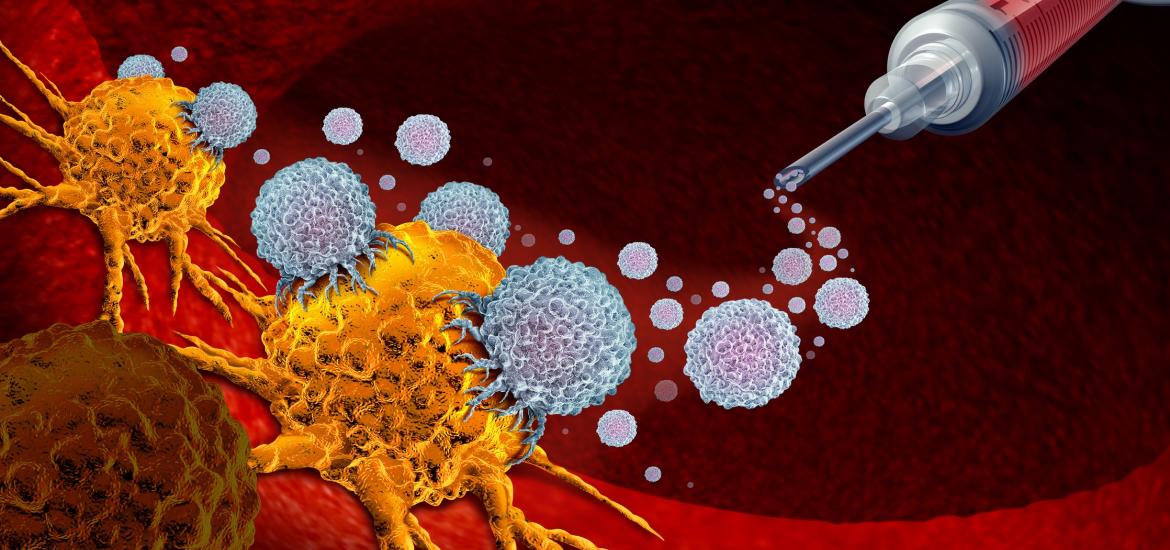
IO Biotech looks for an interim injection
The group plays down upcoming interim analysis, but still hopes for accelerated approval.
The group plays down upcoming interim analysis, but still hopes for accelerated approval.

Among projects sometimes called “cancer vaccines" neoantigens have stolen recent headlines, but some are still pursuing a more traditional approach. One example is the tiny Danish company IO Biotech, which will soon have an early indication of whether its lead project, the peptide-based IO102-IO103, is having the desired effect.
In the third quarter, the phase 3 Keynote-D18 trial in first-line melanoma is due to yield overall response data from an interim analysis, before its main PFS readout expected next year. Surprisingly, IO’s chief executive officer, Mai-Britt Zocca, has played down this catalyst, saying PFS was the “most important readout”.
Importantly, the trial is controlled, pitting IO102-IO103 plus Keytruda against Keytruda alone, and is powered accordingly. “ORR is like the cherry on the cake,” she told ApexOnco. Nevertheless, IO does hope to file for accelerated approval based on the interim analysis.
The group, worth just $78m, has $118m in the bank, which it says is enough until late 2025, but an interim win could bolster interest. On the flip side, failure would pour more scepticism on an approach that has already suffered various setbacks. Regardless of the interim analysis, the trial is designed to continue to the primary PFS endpoint.
T-winning?
IO hopes that IO102-IO103 will boost patients’ immune systems by delivering peptide epitopes from immune-suppressive antigens, designed to activate T cells specific for those antigens. The group claims to be able to target tumour cells and immunosuppressive cells in the tumour microenvironment – a “one-two punch” it calls T-win.
Specifically, IO102-IO103 comprises IDO and PD-L1 peptide antigens. While IDO inhibition has fallen short in the past, Zocca explains that this is a different approach, targeting cells overexpressing IDO, rather than the IDO enzymatic pathway.
A rival project also designed to boost T cells against IDO and PD-L1 is Moderna’s mRNA-4359, currently in a phase 1/2 trial.
Meanwhile, IO’s hopes have been boosted by an uncontrolled, investigator-sponsored phase 1/2 study, MM1636, which tested IO102-IO103 plus Opdivo in front-line melanoma and found an 80% ORR.
When asked if IO could replicate this result in phase 3, its chief medical officer, Qasim Ahmad, conceded that this was unlikely. Ultimately, the group is looking for an 18-point difference between the combo and Keytruda alone.
But IO has “spent very little alpha” on ORR, he noted, adding that 91% of the trial’s statistical power has been assigned to the primary PFS endpoint.
Comparator
One question is whether IO has chosen the right combo and comparator. Opdivo plus Yervoy is also used in front-line melanoma, and 2022 saw approval of Opdualag, Bristol Myers Squibb’s fixed combo of Opdivo and the Lag3-targeting relatlimab.
But the Opdivo-Yervoy combo comes with toxicity concerns, and Opdualag was approved after IO had begun its trial.
The group hopes to be at least on par with existing therapies, but with better safety. In terms of benchmarking, the Relativity-047 trial found a median PFS of 10.1 months with Opdualag.
Aside from Keynote-D18, IO is also carrying out two phase 2 Keytruda combo basket trials, one in first-line NSCLC and head & neck cancer, and the other testing neoadjuvant/adjuvant therapy in melanoma and head & neck.
Preliminary data from the former featured at ESMO last year, and the group plans to present more results this autumn, perhaps at ESMO or SITC, Ahmad said. Meanwhile, the (neo)adjuvant trial could yield results next year.
Ahmad pointed out that IO102-IO103 was an off-the-shelf project, which could give it an advantage over neoantigen-based immunotherapies like Moderna/Merck & Co’s mRNA-4157 (V940) and BioNTech/Roche’s autogene cevumeran.
Before this will become a consideration, though, IO has to show activity in a controlled trial.
IO Biotech’s studies of IO102-IO103
| Trial name (ID) | Phase | Setting | Regimen | Note |
|---|---|---|---|---|
| Keynote-D18 (NCT05155254) | 3 | 1L melanoma | + Keytruda, vs Keytruda | Interim analysis due Q3 2024; PFS (primary endpoint) analysis expected H1 2025 |
| Keynote-D38 (NCT05077709) | 2 | 1L NSCLC, SCCHN & UBC | + Keytruda (uncontrolled) | Preliminary data at ESMO 2023; more data expected autumn 2024 |
| PN-E40 (NCT05280314) | 2 | (Neo)adjuvant melanoma & SCCHN | + Keytruda (uncontrolled) | Data expected 2025 |
NSCLC=non-small cell lung cancer; SCCHN=squamous cell carcinoma of the head and neck; UBC=urothelial bladder cancer. Source: OncologyPipeline & clinicaltrials.gov.
1239













